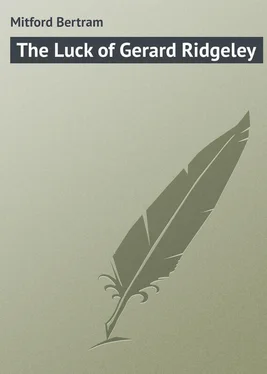Bertram Mitford - The Luck of Gerard Ridgeley
Здесь есть возможность читать онлайн «Bertram Mitford - The Luck of Gerard Ridgeley» — ознакомительный отрывок электронной книги совершенно бесплатно, а после прочтения отрывка купить полную версию. В некоторых случаях можно слушать аудио, скачать через торрент в формате fb2 и присутствует краткое содержание. Жанр: foreign_prose, на английском языке. Описание произведения, (предисловие) а так же отзывы посетителей доступны на портале библиотеки ЛибКат.
- Название:The Luck of Gerard Ridgeley
- Автор:
- Жанр:
- Год:неизвестен
- ISBN:нет данных
- Рейтинг книги:5 / 5. Голосов: 1
-
Избранное:Добавить в избранное
- Отзывы:
-
Ваша оценка:
- 100
- 1
- 2
- 3
- 4
- 5
The Luck of Gerard Ridgeley: краткое содержание, описание и аннотация
Предлагаем к чтению аннотацию, описание, краткое содержание или предисловие (зависит от того, что написал сам автор книги «The Luck of Gerard Ridgeley»). Если вы не нашли необходимую информацию о книге — напишите в комментариях, мы постараемся отыскать её.
The Luck of Gerard Ridgeley — читать онлайн ознакомительный отрывок
Ниже представлен текст книги, разбитый по страницам. Система сохранения места последней прочитанной страницы, позволяет с удобством читать онлайн бесплатно книгу «The Luck of Gerard Ridgeley», без необходимости каждый раз заново искать на чём Вы остановились. Поставьте закладку, и сможете в любой момент перейти на страницу, на которой закончили чтение.
Интервал:
Закладка:
“Oh, I suppose it’s all right,” said Harry, rather uncomfortably, for this aspect of the case had struck him as not encouraging. “But I don’t know what I shall do yet. I think I’ll look around a bit first. It’s a mistake to be in too great a hurry over matters of this kind, don’t you know. And I’ve got a lot of letters of introduction.”
Mr Kingsland looked at him curiously for a moment, as if about to make a remark, and then thought better of it. He turned to Gerard again.
“If I were you, Ridgeley – if I might offer you a bit of advice – I wouldn’t stop on here. Get on to Maritzburg as soon as you can and look up your relative. Anyway, you can’t do any good by hanging on here. Now, there’s a man I know starting from Pinetown with a load of goods. He’d give you a passage up there on his waggon for the cost of your keep, and that’s a mere trifle; and you’d have the advantage of seeing the country and at the same time getting an insight into waggon travelling. But you’ll have to leave here by an afternoon train. He starts from Pinetown to-night.”
“It’s awfully kind of you, Mr Kingsland,” said Gerard. “There’s nothing I should like better. How shall we find him?”
“That’s easily done. Pinetown isn’t such a big place. Dawes, his name is – John Dawes. I’ll give you a line to him. If you won’t take anything more I’ll go and write it now.”
Just before they took leave of each other Mr Kingsland found an opportunity of speaking to Gerard apart.
“Look here, Ridgeley, I don’t say I shall be able to help you in that notion of yours about getting on a farm, but I may be. You see I’ve got a couple of boys of my own, and between them and myself we haven’t room for another hand on the place. I won’t even ask you to come and see us – not just now, because the sooner you get into harness the better. But afterwards, whenever you have a week or two to spare, we shall be delighted to see you, whenever you can come, and as long as you can stay. That’s a very first-rate idea of yours to get your foot in the stirrup before you think of anything else; and when you’ve got your foot in the stirrup, keep it there. Stick to it, my lad, stick to it, and you’ll do well. One word more. This is a deuce of a country for fellows getting into a free-and-easy, let-things-slide sort of way – I say so, though I belong to it myself. Now, don’t you let any such influences get hold of you. You’ve got to make your way – go straight through and make it, and while that’s your motto you have always got one friend in this country at any rate, and his name is Bob Kingsland. Well, Maitland,” as Harry rejoined them, “ready to start on such short marching orders, eh?”
“Rather. Anything to get away from those beastly mosquitoes.”
They took leave of their kind entertainer and returned to their lodgings to pack up their traps.
“Rattling good chap, old Kingsland,” said Gerard, enthusiastically, when they were alone again.
The straight commonsense counsel, the kind and friendly interest in him and his welfare, and that on the part of a comparative stranger, on whose good offices he had not a shadow of a claim, touched him deeply. Moreover, he felt cheered, morally braced up for whatever start in life might lie before him. There and then he resolved more firmly than ever that whatever his right hand should find to do, he would do it with all his might.
Gerard Ridgeley’s story was that of many another youngster who has begun life under similar circumstances. He was the eldest son of a professional man, a struggling surgeon in a provincial town, who had recently died, leaving his widow with a family of five and the scantiest of means whereon to maintain, let alone educate, the same. His father, an easy-going thriftless man, had fixed on no definite profession for him, dimly reckoning on the chance that “something was sure to turn up” when the boy was old enough. But the only unexpected thing that did “turn up” was the doctor’s sudden death in the prime of his years, and the consequent straitened circumstances of his widow and family.
So Gerard was removed from school – indeed it was time he should be in any case, for he had turned eighteen. The good offices of an uncle were invoked on his behalf, and somewhat grudgingly given. He was offered his choice between a stool in a counting-house and a free passage to any British colony, with an outfit and a few pounds to start him fair upon landing, and being a fine, strong, manly lad, he had no hesitation in choosing the latter alternative. Then it became a question of selecting the colony, and here the choice became perplexing. But Mrs Ridgeley remembered that a distant relation of hers had emigrated to Natal some years earlier. It was true she hardly knew this relative; still “blood was thicker than water,” and he might be able to give Gerard a helping hand. So it was decided to ship the boy to Natal accordingly.
It was hard to part with him. He was the eldest, and just of an age to be helpful. Still, there were four more left, and, as it happened, Mrs Ridgeley was not a woman who ever displayed over much feeling. She was a good woman and a sensible one, but not ostentatiously affectionate. So the parting between them, though hard, was not quite so hard as some others. One fact is certain. It was the best thing in the world for Gerard himself.
Harry Maitland, on the other hand, was the son of a well-to-do London clergyman. From a pecuniary point of view, therefore, his chances and prospects were immeasurably better than those of his companion. He would inherit a little money by-and-by, of which prospective advantage, however, he was wisely kept in ignorance. He, too, had been sent to the colonies at his own wish, and we think we have shown enough of his character and disposition to suggest grave doubts in our readers’ minds as to whether he would do any good when he got there. But whether he does or not will appear duly in the course of our narrative.
Chapter Four.
John Dawes, Transport-Rider
No time was to be lost in preparing for their start, and also in informing their landlord of their change of plans. This Gerard did with some inward trepidation, knowing that they were expected to make a longer stay. But he need have felt none. That philosophic individual manifested neither surprise nor disappointment. Whether they left or whether they stayed was a matter of supreme indifference to him. He wished them good-bye and good luck in the same happy-go-lucky way in which he had first greeted them, and filled up a fresh pipe.
Though only about a dozen miles from Durban, it took them upwards of an hour to reach Pinetown. But they did not mind this. The line ran through lovely bush country, winding round the hills often at a remarkably steep gradient; now intersecting sugar plantations, with deep-verandahed bungalow-like houses, and coolies in bright clothing and large turbans at work among the tall canes; now plunging through a mass of tangled forest. Every now and then, too, a glimpse was afforded of the blue, land-locked bay, and the vessels rolling at their anchorage beyond the lines of surf in the roadstead outside.
“There lies the old Amatikulu ,” said Gerard, as his ere caught the black hull and schooner rig of a steamer among these. “We shan’t see the old barkie again, and perhaps the sea either, for many a long day.”
Pinetown, as Mr Kingsland had said, was not much of a place, being a large straggling village, greatly augmented by the huts and tents of a cavalry regiment then quartered there, and they had no difficulty in finding John Dawes. Him they ran to earth in the bar-room of an hotel, where, with three or four cronies, he was drinking success to his trip in a parting and friendly glass. He was a man of medium height, straight and well proportioned. His face was tanned to the hue of copper, and he wore a short sandy beard, cut to a point. He took the letter which Gerard tendered him, glanced through the contents, then nodded.
Читать дальшеИнтервал:
Закладка:
Похожие книги на «The Luck of Gerard Ridgeley»
Представляем Вашему вниманию похожие книги на «The Luck of Gerard Ridgeley» списком для выбора. Мы отобрали схожую по названию и смыслу литературу в надежде предоставить читателям больше вариантов отыскать новые, интересные, ещё непрочитанные произведения.
Обсуждение, отзывы о книге «The Luck of Gerard Ridgeley» и просто собственные мнения читателей. Оставьте ваши комментарии, напишите, что Вы думаете о произведении, его смысле или главных героях. Укажите что конкретно понравилось, а что нет, и почему Вы так считаете.












